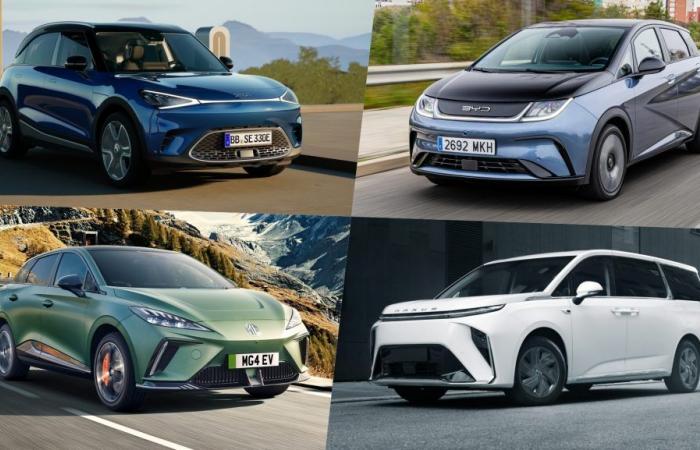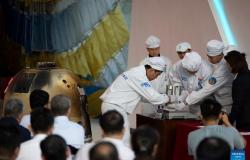06/14/2024 14:21
Updated on 06/14/2024 19:10
On June 12, the EU announced the increase in tariffs of between 17.4 and 38.1% on cars from Chinese factories. The reason? According to the community authorities, the support and subsidies from the Chinese State to its manufacturers incur unfair competition for European producers.
A priori, the measure seems positive for European interests, but China has already warned that it is going to react, and in fact it is already doing so, and the consequences of this response could be equally or more harmful than the effect doping that you want to stop.
For Javier San Martín, professor of Sustainable Operations at OBS Business School, “behind these decisions is the panic about Chinese competitiveness in the automobile market. If we look back, in 2000 China manufactured one million fewer cars than Spain and in 2023 it will have manufactured 27.7 million more. Or what is the same, it has gone from a production quota of 3.54% to one of 32.24%, nine times more at a general level. If we only looked at electric vehicles it would be much worse since their market dominance is overwhelming with almost all the major global manufacturers producing there. “In the same period, Spain has gone from a market share of 5.2% to 2.62% at a general level, which drops to 1.61 in the case of pure electric vehicles (BEV).”
In Hybrids and Electrics we wanted to analyze what we gain and what we lose really with this measure and we have consulted some experts. These are the conclusions.
A fairer competition?
In principle, the measure seeks to protect the interests of European manufacturers by promoting fairer competition. This is the conclusion reached by the community authorities after the investigation carried out in recent months in which they denounce that Chinese brands receive different types of aid and subsidies from the State during the manufacturing process, which allows them to reduce costs. and compete on price against European manufacturers.
Now, although this is a commendable objective and one that, a priori, can benefit European products, the truth is that these tariffs will be applied not only to electric cars from Chinese brands but also to all those electric cars made in China, which also affects many of the European manufacturers that we want to help because they have factories there.
In any case, it is a measure that, as recalled Angel Saz, professor in the Department of General Management and Strategy at Esade and director of EsadeGEO, “opens the debate between fair trade with minimally equitable rules and the need to guarantee the viability of the European economy.”
Something that ANFAC agrees on, “at ANFAC and at ACEA we believe that free and fair trade is essential to create a globally competitive European automotive industry, at the same time we believe that competition on equal terms drives innovation and options for consumers. ANFAC traditionally defends free competition in the market, regardless of where a commodity comes from, as long as all transactions are carried out in compliance with current international trade legislation and have occurred under conditions of equality. “Someone who fails to comply should be penalized for it.”
More local sales
Logically, as the rates for Chinese cars increase with the increase in tariffs, it is expected that their competition with respect to European cars in terms of price will be significantly reduced, which can boost sales of continental brands. . This would be the most direct immediate objective pursued by the measure.
More Chinese factories on European soil
This is a positive effect in the medium term and can extend its benefits for many years: installation of Chinese brand factories on European soil to circumvent the imposition of tariffs. It is an effect that has already been verified in the US with the implementation of the IRA Law, and it is a positive consequence that we can also observe here.
There are already several Chinese brands that had already set up factories in European territory, but after the announcement of the increase in tariffs, some have already rushed to communicate their intentions to look for new locations for their plants on European soil. In fact, Chery Auto, for example, through the president of its European business, Charlie Zhang, has already advanced that, in their case, they will bet on the local production that allows them to “mitigate the impact of tariffs,” as reported Reuters.
Goodbye to the cheap car
It is the other side of the coin. What is good news for the industry is a bad news for the consumer. If before we mentioned as good news the fact that with less price competition, sales of local manufacturers would probably increase. The flip side is that consumers see the possibility of an affordable electric car receding, as confirmed by San Martín, “tariffs are always bad news for consumers, who will find it difficult to access a 100% electric vehicle that is competitive in price.” .
The implementation of tariffs on Chinese cars has a direct consequence already announced by the vast majority of affected manufacturers: the increase in prices. It is more than likely that the brands will pass on a large part of this increase to rates, harming the interests of drivers. And this leads us to the following conclusion.
Stopping the implementation of electric mobility?
Could the exact opposite effect to what you want to achieve be produced? As we have analyzed on many occasions, one of the great obstacles to electric mobility is the high prices of electric cars, which are still very far from the pocket of the average citizen.
The increasingly frequent arrival of Chinese models at interesting prices could presage the more or less near arrival of some model that finally lower the limit of 20,000 euros. Now, with the announcement of price increases by Chinese manufacturers, this possibility is once again receding. We can lose a lot if the development of affordable models is really slowed down.
As Saz concludes, “The energy transition is going to be much more expensive. “If you don’t impose tariffs, you allow China to finance part of that energy transition because it is responsible for providing more affordable models.”
Commercial tension with the East
This is the most immediate negative consequence and we are already seeing it. China has already announced that it will take measures in the form of increase in tariffs on any product from Europe. In fact, it has already announced, for example, an investigation into the French brandy sector.
As you remember Arturo Pérez de Lucia, general director of AEDIVE, “the automotive market is a globalized market and in Europe, including Spain, cars manufactured in China are sold, but they are also exported from the EU, so it is important to know that applying tariffs to China will mean that Europe may also face tariffs from the Asian country. For AEDIVE, obviously, it is important to monitor illicit practices, such as dumping, but it is important that each case be analyzed in particular and not measure the entire Chinese industry by the same standard.”
Increase in the cost of supplies and raw materials
This may be another side effect of the measure. In Europe we depend a lot on other essential components of electric mobility such as batteries or other raw materials, many of them from the Asian country. It is more than likely that this increase in tariffs will end up having an impact, as Pérez de Lucia denounces, in “an increase in prices, a lower availability of products and greater tension in international relations, none of which is beneficial for consumers or manufacturers of European cars.
This being the case, it is not surprising that voices have already emerged strongly calling for an agreement to be reached with China before the entry into force of this tariff increase scheduled for July 4. Such is the case of the German political authorities, very critical of the measure, or of some European manufacturers, such as Stellantis or, mainly, the German brands, with Mercedes, BMW or Volkswagen at the helm.
In the end, as AEDIVE reminds us, “the problem is not that Chinese brands arrive in Europe, but that in Europe has not done its homework to industrially strengthen the sector of the automotive industry and that can compete under conditions with markets such as Asia and North America. The important thing now is that Europe work in public-private collaboration to accelerate this transformation of the industry with effective aid that not only provides added value to the manufacturing of passenger cars, but also heavy vehicles, motorcycles and mopeds, batteries and recycling plants.”
Something in which they agree with ANFAC, “our future involves the survival of a global and open market in which to develop the competitiveness of our industry. In the same way, we defend that the European Union, and especially Spain, develop a strong industrial policy that encourages the production and manufacturing of electric vehicles in our country, and attracts new investments, all in a manner compatible with free trade and competition regulations,” they insist.






